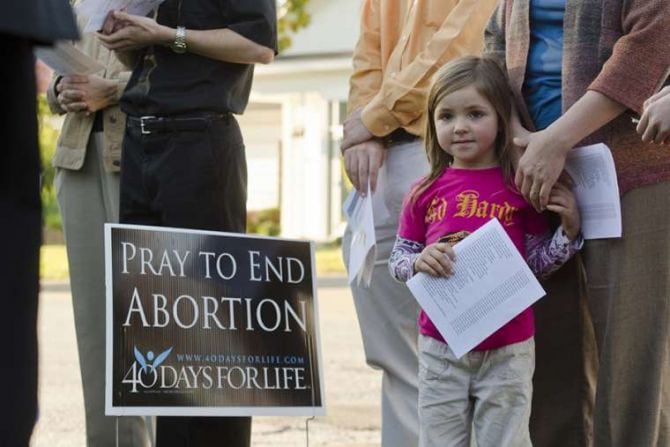
Stormont, the seat of the Northern Ireland Assembly, has been bustling lately. Since First Minister Paul Givan’s (Democratic Unionist Party) resignation on February 3rd over the Northern Ireland Protocol, which automatically removed his deputy Michelle O’Neill (Sinn Féin) from office, Northern Ireland has been without a functioning executive.
With an end to its mandate looming at the end of March before an already anticipated May 5th election, Northern Ireland’s current government is now fast-tracking a wide range of draft legislation. To ensure their timely approval, extra sessions have been scheduled.
One such draft under consideration (presented in October last year) proposes ‘safe access zones’ to be established around buildings that offer ‘sexual and reproductive health services,’ including abortion. If made law, harassing people in any such safe access zone would become a criminal offense. Green Party MLA (Member of the Legislative Assembly) Clare Bailey went so far as to identify “campaign[s] of harassment and intimidation” as the vigils conducted by “anti-abortion campaigners,” and claimed that these have “escalated” in recent months. She proposed a Private Member’s Bill to address the issue.
For Northern Irish Christians, this move by lawmakers is a source of consternation. They face a ban on their prayer vigils outside abortion clinics, so for them, the message is clear: it is they who are being targeted.
'Safe. Legal. On Demand'
— Catholic Arena (@CatholicArena) January 16, 2022
A 'Vigil' which was actually an excuse for pro abortion members of Sinn Fein and Labour to bully and harass Catholic men praying the Rosary, which they had organised weeks ago
This video shows that the vicious aggression was only one way.
Shameful. pic.twitter.com/QhFtxsZKih
Parish priest Paddy McCafferty of Corpus Christi in Belfast is vociferously opposed to the bill. In a scathing Facebook post, published on October 13th last year, he railed against those who proposed it, invalidating the accusations they hurl at such vigils:
Faithful Catholics please take careful note.
Today, every single “nationalist” and “republican” MLA in Stormont voted to prevent and criminalise peaceful and prayerful protests outside abortion mills in Northern Ireland: every single one of them—including those who, lyingly and deceptively, have described themselves as ‘pro life’ to get our votes—the likes of Nichola Mallon, Daniel McCrossan, Pat Catney, and some others. They have alleged that there is “intimidation” and they have slandered the protesters as “extremists” … There is no “intimidation.” There is prayer and the attempt to save unborn lives. There is the presentation of an alternative to abortion—in other words REAL CHOICE! There is the truth that abortion is murder and an appeal not to kill a child.
There is also the troubling of the conscience of those who advocate the slaughter and that is the REAL REASON why they want the prayerful witnesses stopped!
If wanting to prevent infanticide means that Sinn Féin, the SDLP and their cohorts will label you an “extremist,” then so be it. I have no hesitation whatsoever in appealing to faithful Catholics not to vote for any member of Sinn Fein or the SDLP. . . . It is time for us to reject them at the ballot box.
While it is a cross-party initiative, at the forefront of the proposal is the Irish nationalist party Sinn Féin. In a reply on February 10th to Senator Ronan Mullen, leader of the Human Dignity Alliance, an anti-abortion political party, Sinn Féin’s Lynn Boylan said:
Senator Mullen can refer to those involved as decent people, mainly older people, or say they are reflecting in quiet prayer. He can say all of that. It does not matter what they are doing. The reality is that the feeling of the person they are doing it to is one of intimidation.
While fully supporting the right of people to hold different views, she advocated listening to women if they said they felt intimidated.
Today the Safe Access Zones Bill will be debated in the Seanad. I was proud to co-sign this important legislation with my Sinn Féin colleagues and other senators. #SafeAccessZones pic.twitter.com/sXAFx1eV7t
— Lynn Boylan 🍷📖🐾 (@LNBDublin) February 10, 2022
This is very telling from Lynn Boylan of Sinn Féin.
— JRD (@JRD0000) February 10, 2022
She believes that it doesn't matter what anti-abortion protestors are doing, even if it is only praying, and that their right to protest should be suppressed purely because of how other people feel. pic.twitter.com/f67ZtL3UWU
Boylan’s rather broad interpretation of what constitutes ‘intimidation’ could set a legal precedent all its own, with massive implications for free speech.
Turning to the reality on the ground however, an investigation conducted by Gript indicates there is little evidence of intimidation actually taking place. It asked hospitals that provide maternity services if any staff or patients had ever made a formal complaint about pro-life protesters, and if there had ever been an incident in which pro-life protesters impeded the ability of patients to access the hospital, or attempted to intimidate or harass its patients. Out of the 19 hospitals which were queried, 16 responded, and none of these had ever received such a complaint or had to deal with such an incident.
